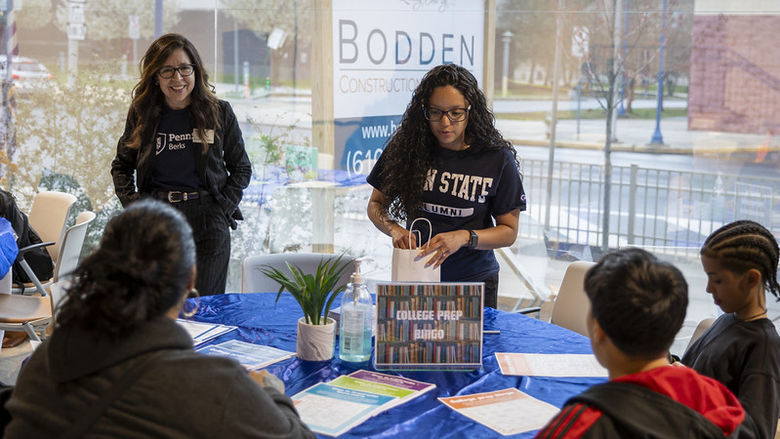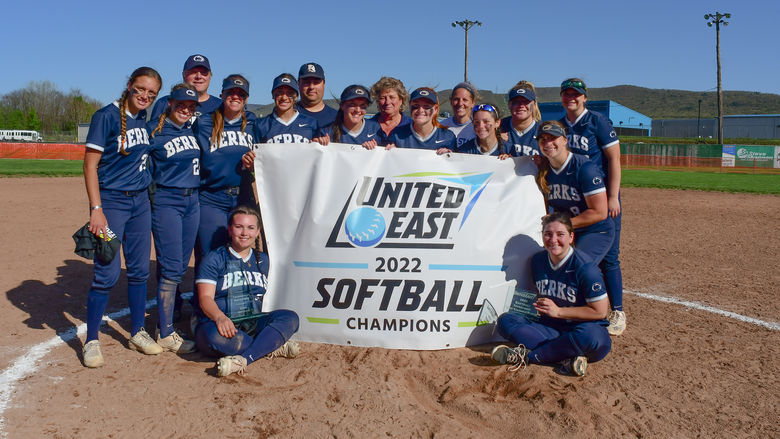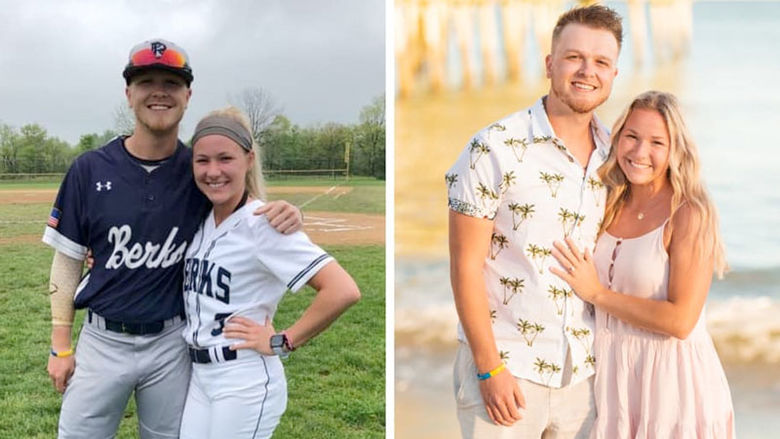

This dialog contains the full navigation menu for this site.

Melissa Daniels Foster began her studies at Penn State Berks and completed her degree at University Park, graduating in 1987 with a B.S. in Chemical Engineering. She was recently named the first female Chief Engineer for ExxonMobil Chemical, with global responsibility for olefins technology, a key plastic organic building block.
Foster, a graduate of Conrad Weiser High School, met her first husband, Peter Stapleton, at Penn State Berks. He later earned a landscape architecture degree from Louisiana State University. Tragically, Stapleton passed away in 2009. She later married William Foster, founder of a civil engineering firm in Houston and father to four children from a previous marriage.
Foster said that many Penn State alumni are working at ExxonMobil, ranked second on the Fortune 500 list. She recruited Penn State graduates at University Park in the past and plans on resuming her on-campus recruiting visits in the near future.
Why did you choose Penn State Berks?
I wanted lots of options for study because I was not sure about engineering when I started. Penn State offered a wide range of curriculum with great credentials and with the option for lower cost by living at home.
What is your best memory of Penn State Berks?
I have many. I thought the professors were generally outstanding teachers. For the first time, I understood calculus because of Dr. Donna Kumagai’s explanation of its concepts. I was challenged, I made great friends, and met my future husband.
Did your experience at Berks prepare you for University Park and ExxonMobil Chemical?
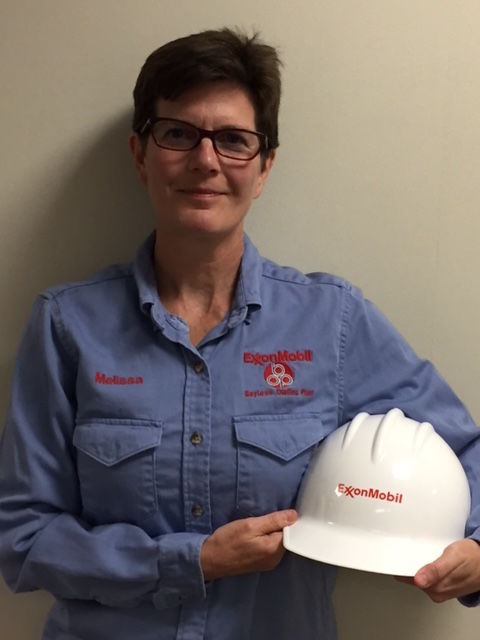
Melissa Daniels Foster
You bet it prepared me! I learned science, math, and English fundamentals; built study skills; and formed collaborative work groups. Today I must rely on my understanding of first engineering principles and collaborative work to quickly make a difference.
Would you recommend Penn State Berks to others?
I would absolutely recommend Berks for the focused time it allowed me to learn science fundamentals without some of the distraction of main campus life. I had a very high GPA average heading to University Park campus such that when I got there I could embrace all it had to offer.
What did you want to be when you grew up?
I actually wanted to be a fireman for a long time. This gravitated to wanting to do something challenging where I could make a difference and make a decent living. The funny thing is I actually became quite knowledgeable about combustion in my role as technical expert.
Why chemical engineering?
I loved chemistry and liked the investigative nature of engineers; they are like detectives trying to solve mechanical and chemical problems with innovative, practical, cost-effective solutions. To me, it was a great combination with many opportunities in a wide range of industries. It was a great decision!
What attracted you to olefins?
Olefins are the building block for plastics. It is growing business where ExxonMobil Chemical has developed industry-leading technology. Growth means there are lots of new manufacturing opportunities where innovative technology is critical. Helping this company grow has made for a very exciting and fun career.
How does it feel to be ExxonMobil Chemical’s first female Chief Engineer?
Fantastic! I let out a big cheer when my boss told me of the promotion. It is also humbling to be in the company of men who have brilliant minds and a privilege to be collaborating with them to bring forward innovative technology that will help us beat the competition and win our market share. It is very exciting to open the door for all the outstanding women coming behind me.
What do you feel is your most significant contribution to date?
There are two that I'm most proud of. The first is reviving the Beaumont, Texas Exxon chemical plant severely flooded by hurricane Ike. I was truly worried the company would choose not to restart, resulting in high job loss. I was the process technical lead and our team helped safely rebuild and restart the plant within six months without any process safety incident (loss of a harmful chemical). It took our entire collective technical and organizational knowhow to accomplish so much so quickly. We saved the manufacturing plant.
The second is improving our largest olefin producing site at Baytown, Texas by bringing in new technology, solving long-standing feedstock quality problems, and setting up systems to sustain high performance. This was a five-year effort.
Why did you want to be president of American Institute of Chemical Engineers chapter at University Park?
Listening to people from industry I realized I needed to complement my technical skills with leadership skills. Since AIChE allowed both I went for it. Leadership is a privilege and a learned skilled.
Does ExxonMobil Chemical give you a chance to be a leader?
Very much so. ExxonMobil Chemical expects you to develop your leadership skills from day one on the job in your immediate work team to eventual worldwide influence. Every assignment, I’ve learned both technical and leadership skills. It takes courage but it is worth it to be a positive influence.
We have many fantastic leaders in this organization. Former CEO Rex Tillerson, now U.S. Secretary of State, visited the Beaumont plant while I was there because of severe weather-related problems. He talked about the importance of the site to ExxonMobil Chemical. I have also met our new CEO Darren Woods. Both are driven to be excellent and insightful long-term thinkers. For them, innovative technology is critical for staying ahead of the competition. Mr. Woods is challenging us to take even more leadership in our business. He is out to win. I find that inspiring.
Is that why you choose ExxonMobil Chemical?
I chose ExxonMobil Chemical because of the talented, motivated, and fun people; the challenging assignments; and the capital to go after all good ideas. It was a great decision.
Are your responsibilities global?
Yes, for the last 10 years I have been responsible for improving our technology worldwide.
What is a typical day like for you?
I don’t know that I’ve got one anymore.
Who or what has been your greatest influence?
I honestly learn from everyone I work with. But hands down, my parents and grandparents influenced me most. My father, Rodney, retired from teaching at Governor Mifflin High School and later became an adjunct professor at Penn State Berks. My mother, Phyllis, retired as an RN from the former Community General Hospital in downtown Reading. My parents were and are inquisitive, hard working, strong in character, and very family oriented.
I also owe a lot to my grandmothers who empowered me greatly. We had many discussions and I remember one where my grandmother, Helen Daniels, strongly advised me, “Melissa, you better figure out how to make a good living because there is no man on this earth who will marry you!” That’s because she lost her husband in her 40s and went to nursing school to be able to care for herself and her three children, including my father.
Because of both of them, one of my treasured books is Grandmothers, which I personalized as a gift for my grandmother, Minerva Snyder. When she died, she left me her book, which sits proudly on my shelf.
Who are your heroes?
My first hero was probably Gloria Steinem for her business savvy and innovative thinking. I got to meet her a few years back at her Moving Beyond Words book signing in Houston and was very impressed. She said how important it was for me to financially fund my own initiatives, as it was necessary for any successful woman. I still find her thoughts interesting.
Now I raise my hat to all the people making a difference in their community, particularly those striving to include diverse cultures and thought.
Is engineering still mostly thought of as a man’s career?
No. It's very different today and changing rapidly. We are hiring about 50 percent women. I truly am inspired by the diversity of ideas this brings. It has truly upped our game.
What career advice would you offer to other women who want to follow in your footsteps?
Be excellent at what you do, collaborate to truly get the best ideas and solutions, be a positive influence on your co-workers and your organization, innovate, and never give up. Know what success means to you and allow your passions to help drive you there. Let your plan for success evolve as your life and interests change. It's going to; this is natural. Stay true to it when making career and family choices. Look for and take opportunities that show your talents. Be willing to take some risk in going after these opportunities.
Would you want to be CEO of ExxonMobil Chemical?
No, I choose to be a technical expert and leader in the development of our chemicals technology because it offers a challenging career and time for a rewarding life. I need more work-life balance. But I appreciate the sacrifices and contributions our senior executives make for the success of our company.
What do you enjoy doing outside of work?
I love to spend time with my family. My husband and I love to cook, garden, and fly fish. Will also like to spend time with our granddaughter, Evelyn, whom we call “Evie.”
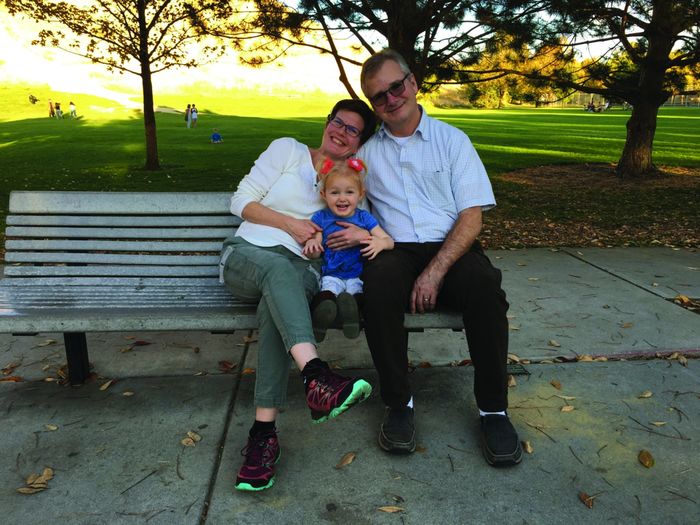
Melissa Daniels Foster with her husband Will and granddaughter Evie
